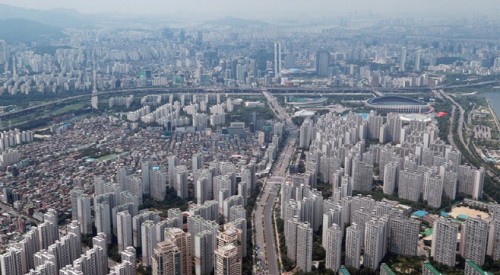 |
| A view of a dense apartment district in Seoul. / Source: Yonhap News |
With the government set to unveil its third real estate package this week, industry watchers expect a broad expansion of designated restriction zones across the Seoul metropolitan area.
According to relevant ministries on October 14, the Land Ministry is in final reviews to classify parts of Seoul and Gyeonggi Province as “overheated speculative districts” or “adjusted areas.”
Despite June’s tighter mortgage cap—capping home‐purchase loans at 600 million won—apartment prices have surged abnormally along Seoul’s so-called Han River belt, including Seongdong, Mapo and Gwangjin.
As Gangnam’s three districts (Seocho, Gangnam, Songpa) and Yongsan were already under both tightened regulations and land-transaction permit zones, demand spilled over into the unregulated Han River belt as well as Bundang in Seongnam and Gwacheon.
As a result, many expect the pending measures to include relatively wide-ranging designations.
Once designated, loan-to-value (LTV) limits for first-time buyers and single-home owners under disposal conditions would be cut to 40% from 70%. The debt-to-income (DTI) cap would also be reduced to 40%, making it harder to fund purchases via borrowing. Buyers would additionally face higher acquisition and capital-gains taxes, tighter resale (allocation transfer) restrictions, and limits on repeat lottery wins for new-build subscriptions.
Leading candidates include Seoul’s Seongdong, Gwangjin and Mapo—where gains have been steep—along with Dongjak, Gangdong, Yangcheon and Yeongdeungpo, plus Bundang in Seongnam and the city of Gwacheon in Gyeonggi Province.
Some observers even see a scenario in which most of Seoul is placed under regulation.
Policymakers are also weighing concurrent expansions of regulation zones and land-transaction permit zones. A recent plan (the Sept. 7 package) to broaden the land minister’s authority to designate permit zones, however, will require statutory amendments and time.
Even so, many argue that land-transaction permit zones—with on-site residency requirements—are the most effective tool to curb “gap investing” (buying with a large jeonse deposit).
While the industry expects such tough measures to cool overheated prices effectively, backlash is likely from genuine end-users whose purchasing power would also be constrained.
Most Read
-
1
-
2
-
3
-
4
-
5
-
6
-
7





















